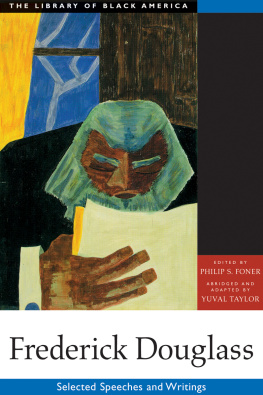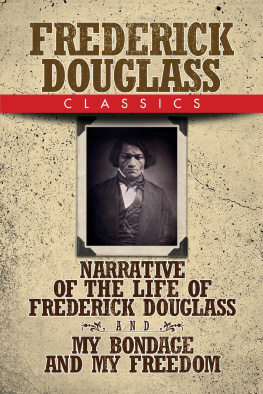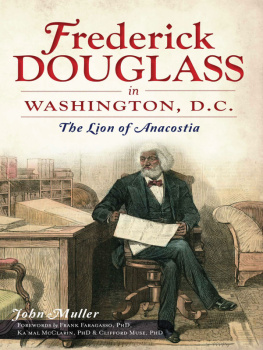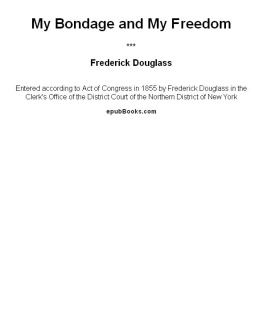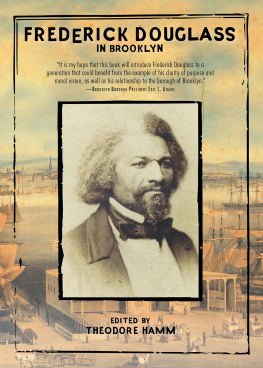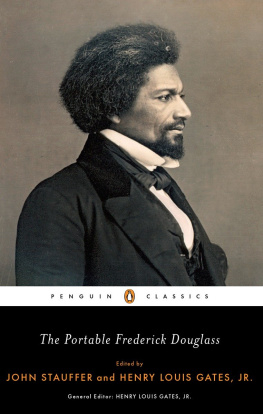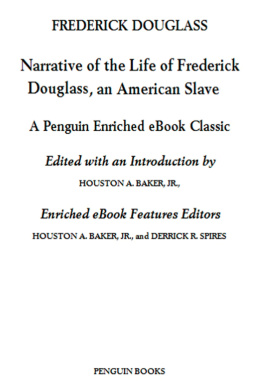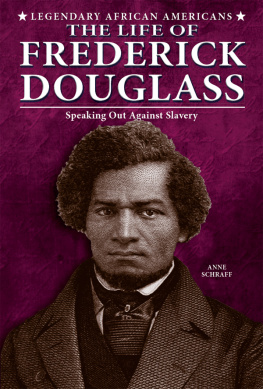Frederick Douglass

This book was published with the assistance of the John Hope Franklin Fund of the University of North Carolina Press.
2018 The University of North Carolina Press
All rights reserved
Manufactured in the United States of America
Designed by Jamison Cockerham. Set in Arno, by Robert Slimbach; Cutright, by Walden Font Co.; and Sorts Mill Goudy, by Barry Schwartz (after Frederic Goudy). Set by codeMantra.
Cover photograph: Frederick Douglass. Half-length portrait, n.d., unidentified photographer; image no. 35765. Courtesy of the Collection of the New-York Historical Society.
The University of North Carolina Press has been a member of the Green Press Initiative since 2003.
LIBRARY OF CONGRESS CATALOGING-IN-PUBLICATION DATA
Names: Dilbeck, D. H., author.
Title: Frederick Douglass : Americas prophet / D. H. Dilbeck.
Description: Chapel Hill : The University of North Carolina Press, [2018] | Includes bibliographical references and index.
Identifiers: LCCN 2017026932 | ISBN 9781469636184 (cloth : alk. paper) | ISBN 9781469636191 (ebook)
Subjects: LCSH: Douglass, Frederick, 18181895. | Douglass, Frederick, 18181895Religion. | African American abolitionistsBiography. | African American oratorsUnited StatesBiography.
Classification: LCC E449.D75 D55 2018 | DDC 973.8092 [B]dc23
LC record available at https://lccn.loc.gov/2017026932
To Pearl and Jack
With what shall I come before the Lord
and bow down before the exalted God?
Shall I come before him with burnt offerings,
with calves a year old?
Will the Lord be pleased with thousands of rams,
with ten thousand rivers of olive oil?
Shall I offer my firstborn for my transgression,
the fruit of my body for the sin of my soul?
He has shown you, O mortal, what is good.
And what does the Lord require of you?
To act justly and to love mercy
and to walk humbly with your God.
MICAH 6:68
Contents
Illustrations
Gore Shooting Denby
Mrs. Auld Teaching Him to Read
Frederick Douglass, ca. 1847
Frederick Douglass, 1856
Riot in Tremont Temple, Boston, 3 December 1860
Frederick Douglass, 1870
Frederick Douglass, ca. 1880
Frederick Douglass
Introduction: A Voice Crying in the Wilderness of Christian Slaveholding America
On 5 July 1852, in the stately Corinthian Hall of Rochester, New York, Frederick Douglass shouldered a heavy burden as he ascended the speakers platform and looked out on his audience. The burden was by now a familiar one to Douglass. He had grown accustomed to feeling it acutely each July as Americans celebrated their national independence. Douglass had accepted an invitation from the Rochester Ladies Anti-Slavery Society to take part in their Fourth of July celebrations. On 5 July, well over 500 people gathered at Corinthian Hall to hear Douglass deliver the days keynote address. Although only thirty-four years old, he was Americas most famous abolitionist orator, and the chance to hear him speak that day was well worth the 12 1/2-cent price of admission.
Fourteen summers earlier, Douglass had escaped from slavery in his native Maryland. He knew well the cruelty of the institution he now made a living denouncing. Not long after settling as a fugitive in New Bedford, Massachusetts, Douglass won the attention of the states abolitionist leaders, who, after hearing him retell his harrowing life story, offered him a paid position on the antislavery lecture circuit. Douglass made hundreds of speeches over the next decade, routinely evoking the horrors of his captivity and ridiculing the defenders of slavery.
But his oration on 5 July 1852 was different. That day, amid boisterous celebrations of American independence, he delivered the greatest speech of his life. Douglass spoke as a man born into bondage in America more than forty years after the Declaration of Independence had proclaimed that all men were equal and endowed by God with liberty. The burden Douglass felt on 5 July 1852 was to speak a word of truth about America in the irony-ridden age of slavery. He tried that day to answer for his overwhelmingly white audience in Corinthian Hall a question posed in the title of his address: What to the Slave Is the Fourth of July?
In answering that question, Douglass delivered a scorching sermon that condemned Americans for their hypocrisy, urged them to repent of their sins, and beseeched them to pursue the true righteousness that exalts a nation. Douglass said that on the Fourth of July, more than any other day, slaves saw clearly American duplicity and discrimination. He told his jovial white Rochester audience that to the slave, your celebration is a sham; your boasted liberty, an unholy license; your national greatness, swelling vanity; your sounds of rejoicing are empty and heartless; your shouts of liberty and equality, hollow mock; your prayers and hymns, your sermons and thanksgivings, with all your religious parade and solemnity, are to him mere bombast, fraud, deception, impiety, and hypocrisya thin veil to cover up crimes which would disgrace a nation of savages. Douglass wished he could speak to every white American on Independence Day, and pour out a fiery stream of biting ridicule, blasting reproach, withering sarcasm, and stern rebuke. He thundered words of judgment to a nation blithely traversing a wicked path. The hypocrisy of the nation must be exposed; and its crimes against God and man must be proclaimed and denounced.
Sometime in the eighth century BCE, in the Kingdom of Judah, there was born a Hebrew prophet named Isaiah. He prophesied for at least six decadesduring the reigns of Uzziah, Jotham, Ahaz, and Hezekiahto the Lords chosen people, who had given themselves over to idolatry and evil. The Israelites had divided into two kingdoms, Israel and Judah, and Isaiah lived to see the existence of both threatened by another kingdom, Assyria. The Book of Isaiah, which records the prophets visions and pronouncements, begins with a condemnation of Judahs wickedness: Ah sinful nation, a people laden with iniquity, a seed of evildoers, children that are corrupters: they have forsaken the Lord, they have provoked the Holy One of Israel unto anger, they are gone away backward (Isaiah 1:4). Then the Lord, through Isaiah, exhorts his chosen to pursue true righteousness: And when ye spread forth your hands, I will hide mine eyes from you: yea, when ye make many prayers, I will not hear: your hands are full of blood. Wash you, make you clean; put away the evil of your doings from before mine eyes; cease to do evil; Learn to do well; seek judgment, relieve the oppressed, judge the fatherless, plead for the widow (Isaiah 1:1517).
Less than eight centuries later, another prophet appeared to the same people who had once received Isaiah. At the far eastern edge of the Roman Empire, Jesus Christ preached salvation and liberation: The time is fulfilled, and the kingdom of God is at hand: repent ye, and believe the gospel (Mark 1:15). One Sabbath, at the start of his public ministry, Christ entered the synagogue at Nazareth, his hometown. He came to read aloud from the Hebrew scriptures. He opened the scroll to Isaiah and read: The Spirit of the Lord is upon me, because he hath anointed me to preach the gospel to the poor; he hath sent me to heal the brokenhearted, to preach deliverance to the captives, and recovering of sight to the blind, to set at liberty them that are bruised, to preach the acceptable year of the Lord (Luke 4:1819). The crowd gathered at the synagogue erupted in anger when Christ announced that his arrival had fulfilled Isaiahs prophecy. He proclaimed himself the long-awaited Messiah.
Next page

